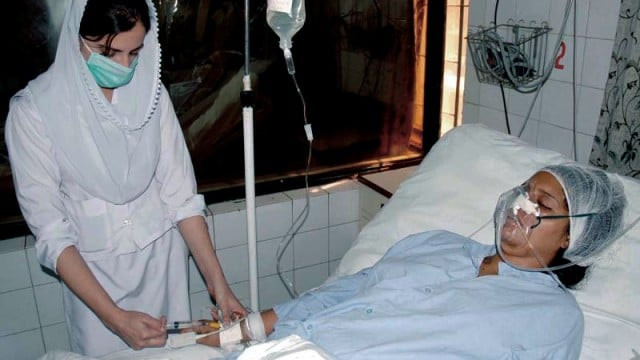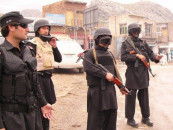Nearly 15% of country’s paramedics have hepatitis, experts warn hospital staff
WHO helping pilot a project at Jinnah hospital to teach safe waste disposal.

The highest number, 14.7%, of hepatitis B cases in hospital staff were found in paramedics across the country, much to the alarm of the Pakistan Medical Research Council in a study two years ago. And while the data might not be current, the authorities are not taking it lightly.
At a seminar on Saturday, the PMRC’s deputy director, Dr Waqaruddin Ahmed, said to an audience of nurses, medical students and doctors, that in order to battle the spread of blood-borne infections, they were launching a pilot project on disposing hospital waste. The project will first be unveiled at Jinnah hospital with the World Health Organisation and The Health Foundation. A needle pit will be constructed for the disposal of shredded pieces of needles and other sharp objects. Even though the WHO-approved methods of getting rid of hospital waste have been in practice, staff are still reusing needles and syringes.
The Institute of Nurses seminar was organised at the Dow University of Health Sciences in a bid to make work safer for nurses and paramedics. The PMRC survey found that aside from the paramedics, hepatitis was found in 7.3% of nurses, 6.8% of doctors and 5.2% of medical students.
“Sharp waste generated at hospitals and similar settings contribute to a minimum of 20% of all infections in the country,” said the PMRC’s Dr Waqaruddin Ahmed.
More than 12 million people in Pakistan suffer from blood-borne diseases. “The infections are found to be primarily contracted in clinics or hospitals with an utter disregard for mandatory procedures,” said PMRC Director Dr Huma Qureshi. She explained that they were not properly getting rid of syringes, were reusing drips and catheters, were not properly applying multi-load vials or sterilising instrument.
Not only infected needles, but even thermometers shared by patients spread infections. When the thermometer is placed in the mouth of the patient, it gathers bacteria and viruses that are transmitted to the person who uses it next. In other countries no one puts the thermometer in the mouth. Staff put them in the armpit.
Staff are also vulnerable to infected fluids such as tissue, sputum and human waste. “Airborne viral infections such as influenza are caused by a lack of cough etiquette and sneezing is a threat often overlooked by many,” said Qureshi. Other blood borne infections are contracted by unassuming spouses whose partners have been drug users or have been exposed to infections during medical treatment. Nurses, paramedics, janitorial staff should be made aware of the sources of these dangerous infections, she stressed. The event was titled “Infection Control and Its Prevention” and was organised by post-resident nurses, students, senior elective students of the IoN in DUHS, in collaboration with Rural Support and Development Society, and Hepatitis Advisory Board.
Published in The Express Tribune, June 26th, 2011.



















COMMENTS
Comments are moderated and generally will be posted if they are on-topic and not abusive.
For more information, please see our Comments FAQ